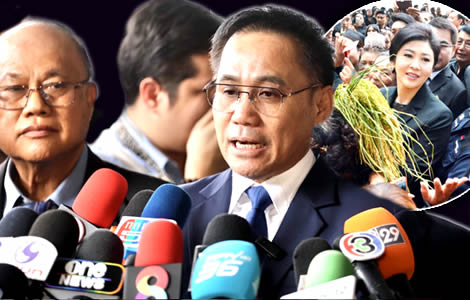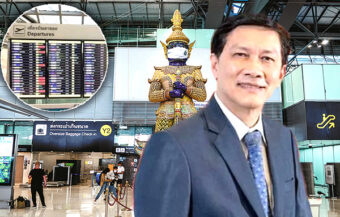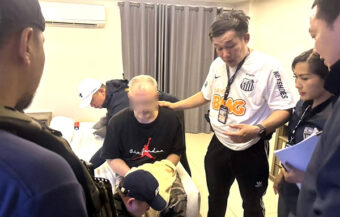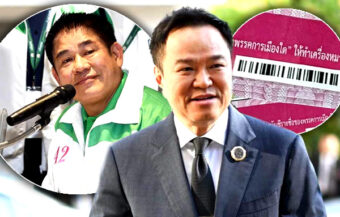Thailand’s Supreme Court slaps Yingluck with ฿10bn debt over rice scheme. She calls it hopeless, but her lawyer vows to fight on, citing fresh evidence that rice sale revenues were never counted. Retrial bid expected within 90 days under court law.
The Supreme Administrative Court in Thailand handed former Prime Minister Yingluck Shinawatra a big blow on Thursday. The court reversed a previous decision absolving the former premier of responsibility for losses caused by the disastrous rice-pledging scheme. In a split decision, and with a significant minority dissenting opinion, it imposed a debt judgment of ฿10.028 billion. Later, the former PM, speaking from abroad, appeared dejected by the news, saying she could not possibly hope to pay it off during her lifetime. However, her lawyer, Mr Narawit Lahlaeng—who rushed to the court without speaking to his client—later appeared to hold out hope for a retrial, claiming Ms Yingluck’s liability was nil.

Former Thai Prime Minister Yingluck Shinawatra was hit with a crushing legal blow on Thursday. The Supreme Administrative Court ordered her to pay ฿10.028 billion ($305 million) in damages over losses from the controversial rice-pledging scheme.
The court’s ruling partially reversed a lower court verdict that had previously cleared her of liability. However, it still reduced the original demand from the Ministry of Finance, which sought over ฿35 billion in compensation.
Yingluck, who fled Thailand in 2017, reacted with sorrow from abroad. In a statement, she said the court was holding her responsible “for a debt I did not cause.” She claimed she had acted in good faith to support struggling Thai farmers.
Yingluck says damages ruling was unfair as rice scheme was meant to help farmers and she acted in good faith
“I have no intention to cause damages,” she said. “This amount cannot be repaid in a lifetime, no matter how much I work.”
The ruling stems from a flagship policy of her government between 2011 and 2014. The rice-pledging scheme was designed to help farmers by buying rice at above-market rates—sometimes 50% higher than global prices. It was one of two major campaign promises, alongside a nationwide ฿300 minimum wage.
The scheme helped her Pheu Thai Party secure a landslide win in the 2011 general election. But it soon turned into a political and economic liability.
Thailand lost its global rice export crown as cheaper rivals stepped in. Massive stocks of unsold rice rotted in warehouses. Meanwhile, alleged corruption in rice sales to China worsened the damage. Officials later confirmed fake government-to-government deals were signed, while huge quantities of rice disappeared or were sold at a loss.
The total estimated loss from the scheme ranges from ฿450 billion to ฿620 billion. Yingluck’s government fell in May 2014 after months of street protests and a divisive Constitutional Court ruling. She was removed from office just weeks before a military coup ended her premiership.
Former PM faced criminal conviction and exile after a court ouster and mounting losses from rice scheme
After her removal, authorities launched investigations into the rice policy. Key ministers and officials were later jailed. Yingluck herself was convicted in absentia in 2017 for criminal negligence and sentenced to five years in prison.
Although she remains in exile, recent years have seen courts ease pressure on her. In December 2023, she was cleared of abuse of power over a 2013 personnel transfer. She was also found not guilty in a separate case involving public funds.
In turn, a previous ฿35 billion civil court judgement was later annulled by the courts. Significantly, this came after Ms Yingluck Shinawatra and her husband had seen 30 properties seized and sold to pay the money allegedly due.
Therefore, this week’s ruling signalled a new twist in her legal battle.
Her personal lawyer, Mr Narawit Lahlaeng, appeared outside court hours after the decision. He confirmed that Yingluck was shocked by the ruling and had not yet been properly briefed.
Yingluck’s lawyer disputes damages verdict and says there are grounds to seek a new trial in court
Still, Narawit vowed to challenge the verdict. He said there were grounds to request a retrial based on new evidence.
“We believe the sale of leftover rice has not been properly counted,” he told reporters. “That money could offset the damages.”
According to Narawit, nearly 18.9 million tonnes of rice remained in storage at the time of the 2014 coup. Much of this rice was sold in subsequent years, particularly during the Prayut and even recent Pheu Thai ministries.
Importantly, he argued that this rice generated between ฿140 billion and ฿250 billion. That revenue, he said, was never subtracted from the Finance Ministry’s original loss estimate.
“Therefore, Ms Yingluck may not have to pay compensation at all,” Narawit said. “We will use this as new evidence in court.”
However, the fact-finding phase has ended, meaning the court did not accept this evidence during the current trial. As a result, Narawit plans to formally submit a request for a new trial within 90 days, under Section 75 of the Administrative Court Procedures Act.
Lawyer claims rice sale revenue offsets losses but court rejected evidence under current trial rules
He also revealed that nearly all assets seized from Yingluck have already been sold. But the exact figures are being handled by another legal team. He noted that the Finance Ministry had lifted any claims beyond the ฿10.028 billion already set.
Still, challenges remain. A significant portion of the stored rice had degraded during long warehouse storage. Between 2015 and 2019, it was sold as low-quality grain for just ฿3–5 per kilogram. Later, under Minister Phumtham Vejjayachai, some of the rice sold for as much as ฿18 per kilogram.
Narawit claimed these proceeds also helped reduce the fiscal damage. “More than ฿100 billion has been recovered from rice sales since General Prayut’s term,” he said.
Asked whether the rice was sold to repay Yingluck’s debts, Narawit said the buyers were private companies. “No one paid on Yingluck’s behalf,” he insisted. “But the state still got the money.”
He added that Yingluck’s case was not linked to whether she might return to Thailand. “This is a civil case,” he said. “It has nothing to do with any criminal matter.”
Narawit says Yingluck remains abroad. Rice proceeds helped reduce state losses but not taken off her debt
Nevertheless, political analysts believe the verdict reflects deeper tensions in Thai politics.
The Shinawatra family remains a polarising force. Thaksin Shinawatra, Yingluck’s older brother, returned to Thailand in August 2023 after 15 years abroad. Though convicted of corruption, he received a royal pardon and spent much of his sentence at a police hospital rather than jail.
His return raised eyebrows and sparked fierce backlash from anti-Thaksin groups. Many claim he still wields influence through his youngest daughter, Prime Minister Paetongtarn Shinawatra.
Though she secured support from former coup-aligned parties to form the current government, Thaksin’s name continues to draw scrutiny. Complaints and petitions about his medical stay, his legal status, and his political role keep surfacing.
Moreover, the timing of the court’s verdict on Yingluck has fueled speculation. Some see it as a signal that key establishment cliques within the civil service remain hostile to the Shinawatras.
Political climate heats up amid backlash to Thaksin’s return and Yingluck verdict ahead of Senate vote
A Supreme Court hearing for Thaksin is scheduled for June 13. It will review his early release and commuted sentence. The outcome could impact his legal standing—and potentially Paetongtarn’s leadership as well.
Meanwhile, the 2024 Senate election has stirred further tensions. Allegations of fraud and elite collusion have rocked the political landscape. Observers say these events suggest a broader power struggle between Thailand’s old guard and the Pheu Thai-led coalition.
Release of former Commerce Minister clears the way for the return in 2025 of ex-PM Yingluck Shinawatra
Doctors with the Corrections Department who treated Thaskin censured and suspended by Medical Council
Thaksin denied court permission to fly to Qatar where he had hoped to meet US President Donald Trump
Back at the court, Narawit wore a blue necktie embroidered with Yingluck’s signature. He said she had given it to him while she was Prime Minister.
“I wear this to show I’ll fight to the end,” he said. “We’re not done yet.”
As Yingluck faces another uphill legal battle from afar, her family’s political future in Thailand remains under a cloud. Yet for many supporters, Thursday’s verdict was not just about rice.
Join the Thai News forum, follow Thai Examiner on Facebook here
Receive all our stories as they come out on Telegram here
Follow Thai Examiner here
Further reading:
Doctors with Corrections Department who treated Thaskin censured and suspended by Medical Council
Thaksin denied court permission to fly to Qatar where he had hoped to meet US President Donald Trump
Thaksin does not rule out joining talks in US as Thai team finalises plans. They fly out on Thursday
Trump’s remaking of World trade, if it works, will force Thailand to decide between the US and China


















